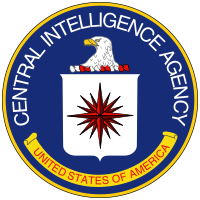
Back Central Intelligence Agency Afrikaans Achencia Central d'Intelichencia AN وكالة المخابرات المركزية Arabic وكالة المخابرات الأمريكية ARZ Axencia Central d'Intelixencia AST Mərkəzi Kəşfiyyat İdarəsi Azerbaijani مرکزی ایطلاعات تشکیلاتی AZB Үҙәк разведка идаралығы Bashkir Цэнтральнае разведвальнае ўпраўленне Byelorussian Цэнтральная разьведвальная ўправа BE-X-OLD
 Seal of the Central Intelligence Agency | |
 Flag of the Central Intelligence Agency | |
 George Bush Center for Intelligence in Langley, Virginia | |
| Agency overview | |
|---|---|
| Formed | September 18, 1947 |
| Preceding agencies | |
| Type | Independent (component of the Intelligence Community) |
| Headquarters | George Bush Center for Intelligence, Langley, Virginia, U.S. 38°57′07″N 77°08′46″W / 38.95194°N 77.14611°W |
| Motto | (Official): The Work of a Nation. The Center of Intelligence. (Unofficial): And ye shall know the truth and the truth shall make you free[2] |
| Employees | 21,575 (estimate)[3] |
| Annual budget | $15 billion (as of 2013[update])[3][4][5] |
| Agency executives | |
| Parent department | Office of the President of the United States |
| Parent agency | Office of the Director of National Intelligence |
| Child agencies | |
| Website | cia |
The Central Intelligence Agency (CIA /ˌsiː.aɪˈeɪ/) is a civilian foreign intelligence service of the federal government of the United States tasked with advancing national security through collecting and analyzing intelligence from around the world and conducting covert operations. The agency is headquartered in the George Bush Center for Intelligence in Langley, Virginia, and is sometimes metonymously called "Langley". A major member of the United States Intelligence Community (IC), the CIA has reported to the director of national intelligence since 2004, and is focused on providing intelligence for the president and the Cabinet.
The CIA is headed by a director and is divided into various directorates, including a Directorate of Analysis and Directorate of Operations. Unlike the Federal Bureau of Investigation (FBI), the CIA has no law enforcement function and focuses on intelligence gathering overseas, with only limited domestic intelligence collection.[6] The CIA is responsible for coordinating all human intelligence (HUMINT) activities in the IC. It has been instrumental in establishing intelligence services in many countries, and has provided support to many foreign organizations. The CIA exerts foreign political influence through its paramilitary operations units, including its Special Activities Center. It has also provided support to several foreign political groups and governments, including planning, coordinating, training and carrying out torture, and technical support. It was involved in many regime changes and carrying out terrorist attacks and planned assassinations of foreign leaders.
During World War II, U.S. intelligence and covert operations had been undertaken by the Office of Strategic Services (OSS). The office was abolished in 1945 by President Harry S. Truman, who created the Central Intelligence Group in 1946. Amid the intensifying Cold War, the National Security Act of 1947 established the CIA, headed by a director of central intelligence (DCI). The Central Intelligence Agency Act of 1949 exempted the agency from most Congressional oversight, and during the 1950s, it became a major instrument of U.S. foreign policy. The CIA employed psychological operations against communist regimes, and backed coups to advance American interests. Major CIA-backed operations include the 1953 coup in Iran, the 1954 coup in Guatemala, the Bay of Pigs invasion of Cuba in 1961, and the 1973 coup in Chile. In 1975, the Church Committee of the U.S. Senate revealed illegal operations such as MKUltra and CHAOS, after which greater oversight was imposed. In the 1980s, the CIA supported the Afghan mujahideen and Nicaraguan Contras, and since the September 11 attacks in 2001 has played a role in the Global War on Terrorism.
The agency has been the subject of numerous controversies, including its use of political assassinations, torture, domestic wiretapping, propaganda, mind control techniques, and drug trafficking, among others.
- ^ "History of the CIA". Central Intelligence Agency. Archived from the original on June 12, 2007. Retrieved March 28, 2014.
- ^ "CIA Observes 50th Anniversary of Original Headquarters Building Cornerstone Laying". Central Intelligence Agency. Archived from the original on March 24, 2010. Retrieved September 18, 2012.
- ^ a b Gellman, Barton; Miller, Greg (August 29, 2013). "U.S. spy network's successes, failures and objectives detailed in 'black budget' summary". The Washington Post. Archived from the original on September 1, 2013. Retrieved August 29, 2013.
- ^ Kopel, Dave (July 28, 1997). "CIA Budget: An Unnecessary Secret". Cato Institute. Archived from the original on February 14, 2021. Retrieved April 15, 2007.
- ^ "Cloak Over the CIA Budget". The Washington Post. November 29, 1999. Archived from the original on September 16, 2018. Retrieved July 4, 2008 – via Federation of American Scientists.
- ^ "How does the FBI differ from the Central Intelligence Agency?". Federal Bureau of Investigation. Archived from the original on February 22, 2023. Retrieved February 22, 2023.